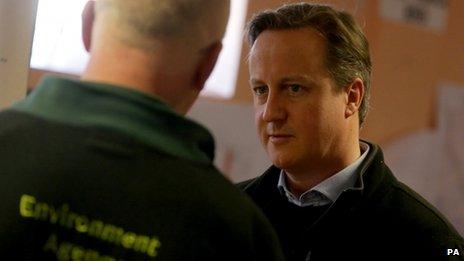Floods: Are politicians more Canute than can-do?
- Published

David Cameron has admitted that extreme weather events are hard to overcome
It was on the marshy banks of the Thames at what would subsequently become Westminster that King Canute supposedly battled the incoming flood tide.
He placed his throne on the beach and commanded the rising waters to halt to show his impotence at the face of the elements.
"Let all the world know the power of kings is empty and worthless," the historians report him as saying.
Today David Cameron was more prosaic. "When you have these extreme weather events, it is very difficult to have all the protections in place that you need," he said.
That was the closest the prime minister came to admitting that there may be a limit to what any politician can do in the face of such weather.
'Stomping'
Yes, he promised more money, more troops, more loss-adjusters, more hardship funds, a new cabinet committee, new grants for flood protection and, of course, more sandbags. But underneath this bustle of activity lay a fundamental question about the role and limits of government.

Canute's more trusting subjects had a watery wake-up call long ago
We voters demand more and more of our politicians. If there is a problem, we often respond by saying that something must be done by somebody else. Send for the emergency services. Call in the army. Even, dare I say it, ring up the council.
And the politicians play along with these demands, producing a new language of supposed activity that can at times be pretty meaningless.
I speak of task forces, hit squads and judge-led inquiries, all designed to persuade us voters that the politicians are doing something. The question is whether sometimes there just is nothing that can be done.
If the rain falls and the floods rise, the authorities can mitigate, they can protect, they can do their best, but can they really stop this amount of water when it flows this fast?
The truth, perhaps, is that the public understand there are limits to government action but nonetheless still judge a politician by his or her reaction to unexpected events because of what it reveals of their true nature.
President Bush was much criticised for his decision to stay on holiday when Hurricane Katrina hit in 2005. And David Cameron was much criticised in 2007 for heading off to Rwanda instead of staying with his flood-stricken constituents; hence his decision to cancel next week's trip to the Middle East.
So, while politicians might be tempted to make like King Canute and admit the limits of their powers, the pressures of modern politics means they cannot, certainly not this close to a general election.
They are listening to people like the woman on tonight's BBC Six O'clock news who said simply: "I will vote for whoever fixes this problem."
Which is why you will see a lot more politicians stomping around in their wellies and high-vis jackets for some time to come.